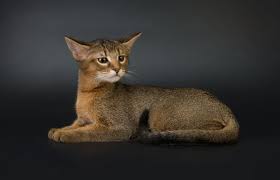
Chausie
Conditions of detention
Chausies are highly active and require plenty of space to roam and explore. They thrive in environments where they have access to climbing structures, interactive toys, and enrichment activities to keep them mentally and physically stimulated.
Useful Fact:
Chausies are known for their athleticism and agility. Providing them with vertical spaces, such as cat trees and shelves, can help satisfy their natural instincts for climbing and exploring.
Nutrition and diet
The Chausie requires a high-protein diet to support its active lifestyle and muscular build. Premium commercial cat foods or a well-prepared raw diet can meet their nutritional needs. It is important to provide a balanced diet with essential vitamins and minerals.
Useful Fact: Chausies may benefit from diets that mimic their wild ancestors, including a variety of meats and minimal carbohydrates.
Health
Generally healthy, Chausies can be prone to common feline health issues such as intestinal problems and certain genetic conditions. Regular veterinary check-ups, vaccinations, and preventative care are essential to maintain their health.
Useful Fact: Due to their wild heritage, some Chausies may have sensitivities to certain foods, requiring careful dietary management.
Grooming and care
The Chausie’s short to medium-length coat is relatively low-maintenance. Regular brushing, typically once a week, helps to remove loose hairs and keep their coat in good condition. Routine nail trimming, ear cleaning, and dental care are also important.
Useful Fact: Despite their wild appearance, Chausies have coats that are easy to manage, making them convenient for busy owners.
Education and training
Chausies are highly intelligent and can be trained using positive reinforcement techniques. They can learn commands, use a scratching post, and enjoy interactive toys that challenge their minds.
Useful Fact: Chausies excel in agility training and can learn complex tricks, making training sessions both fun and rewarding.
Toys and entertainment
These active cats need plenty of physical and mental stimulation. Providing a variety of toys, including puzzle feeders, interactive wands, and climbing structures, is essential to keep them engaged and happy.
Useful Fact: Chausies enjoy activities that simulate hunting, such as chasing laser pointers or feather toys, which cater to their natural instincts.
Safety
Chausies should be kept indoors or in secure outdoor enclosures to protect them from potential dangers like traffic and predators. Ensuring the home is cat-proofed, with secure windows and no hazardous plants, is crucial.
Useful Fact: Providing an outdoor catio can give Chausies the opportunity to enjoy the outdoors safely.
Accessories
Investing in sturdy cat trees, climbing shelves, and scratching posts can enhance a Chausie’s environment. These accessories cater to their climbing and scratching instincts, promoting physical activity and mental stimulation.
Useful Fact: High-quality scratching posts can help maintain a Chausie’s claws and prevent damage to furniture.
Socialization
Chausies are social cats that thrive on interaction with their human companions and other pets. Early socialization with different people, animals, and environments helps them become well-adjusted adults.
Useful Fact: Regular playtime and social interaction are key to preventing boredom and ensuring a happy, well-behaved Chausie.
Travel and Transportation
When traveling, ensure your Chausie is secure and comfortable in a well-ventilated carrier. Familiarizing them with the carrier beforehand can reduce travel-related stress. Regular breaks and access to water are important during long trips.
Useful Fact: Using a pheromone spray inside the carrier can help calm your Chausie and make traveling less stressful.
Behavior and psychology
Chausies are known for their active, playful, and affectionate nature. They form strong bonds with their owners and can become bored if not provided with enough stimulation. Understanding their need for activity and social interaction is crucial.
Useful Fact: Chausies are often described as dog-like due to their loyalty and willingness to engage in interactive play.
Legal aspects
Owning a Chausie may involve understanding local regulations regarding hybrid animals, as some regions have restrictions on owning cats with wild ancestry. Ensure you are aware of and comply with these laws to avoid legal issues.
Useful Fact: Some areas may require special permits to own a Chausie, so it is important to check local regulations before acquiring one.


